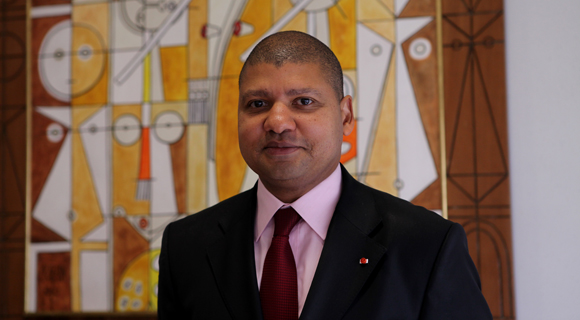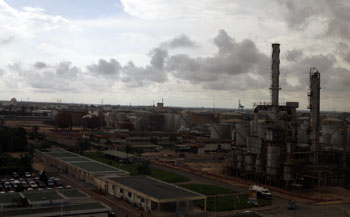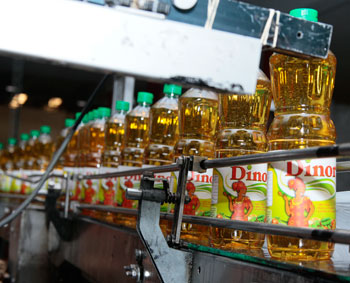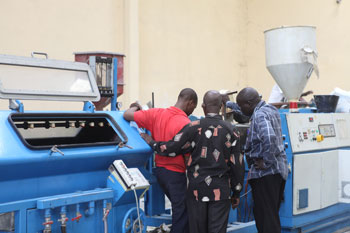Chamber Of Commerce And Industry Côte d’Ivoire
Mr. Billon of Chambre de Commerce et d’Industrie de Côte d’Ivoire talks about the recent crisis in Côte d’Ivoire and its consequences on the commerce and industry in the country that was ahead of Morocco, Tunisia and even Singapore in the period between 1960 and 1985. Côte d’Ivoire is now working on the new investment goals; the last one dates back to 1995.
Interview with Jean-Louis Billon, President of Chambre de Commerce et d’Industrie de Côte d’Ivoire and SIFCA

Do you think the government institutions are adequately trying to fight poverty and instability?
The country was in a crisis for more than ten years; companies were losing jobs and poverty was rising. The program of the new government is, in fact, to end this crisis and put the country back to work. We will see many companies, local and global investors, and confidence in the country coming back. Yes, but we need stability and time to continue this development process.
One of the biggest issues that you staunchly advocate is tax reform. For instance Ghana has a 10% corporate tax compared to 25% in Côte d’Ivoire. How is the government going to provide financing without putting another debt burden on the future generations if internal revenues are low? How are you going to reconcile the discrepancy between these two?
If Ghana could do it, why not Côte d’Ivoire? We have a bigger economy here; we are the largest economy of the West African sub-region after Nigeria. Yet Ghana has a Value Added Tax of 12% when we are at 18%, a corporate tax of 10% when we are at 25%. If you look at Asian countries, they also have a tax system closer to the one in Ghana. The reason for the crisis was bad governance, and we have to restore good governance. I am convinced that with less taxes, we can increase revenues and with good governance, the collected taxes will be utilized for development and not for personal gain.

Do you think a tax reform is possible in the short-term?
As we gain stability and we have a government that is working better than the one before, just in three months we see the IRS (the Internal Revenue Service) in line with their budget. If we have a good start in 2012, I am convinced that we can decrease taxation levels and increase tax revenues. Of course because of the previous crisis, we will need help jump-starting the economy, but we should be alright on our own after that.
What are your thoughts on particular Côte d’Ivoire opportunities some shrewd investors should perhaps consider?
The Côte d’Ivoire is a country with great potential. We were ahead of everyone between 1960 and 1985 — Singapore, South Korea, Morocco, Tunisia — because this country was well-managed, with a clear vision and development process that was sustained for years. We did go into instability and experienced backwards development, but we’re still a developing country. A developing country is a country in construction that shouldn’t see economic crises like the one we experienced. As opposed to Europe or the US that are already mostly developed, here everything is still to be developed. The first opportunity is the restoration and reparation of what was destroyed during the crisis and the war, plus the catch-up that we have to do that will bring many more opportunities in every area of the economy where we have to catch up.
Those are very broad areas; what are the particular areas of development?
This country could be a strong agricultural power like Brazil. We have the same climate and a lot of land with which we can do exactly the same and feed the entire sub-region. We also have opportunities in crude oil, like other countries in the sub-region, but I think agriculture, infrastructure, and new technologies are the areas where this country will see the best growth opportunities.
We have to live the potential of this country… I think agriculture, infrastructure, and new technologies are the areas where this country will see the best growth opportunities.
In your opinion, what are the threats that can endanger these projects?
We are in a reconciliation process which I hope will succeed. What we need most of all is peace, stability, and a good political system where differences are accepted. Other than that, I don’t think we need much. This country is a developing one and with stability, we can dream of anything.
As an insider to this topic, you probably go around and talk to people. Is this reconciliation feasible for the people? Do they want to move ahead or is there still a rift between the people?
There is a will and most Ivorian people want this reconciliation. It’s always one or two politicians who are willing to continue fighting because they think that we are here to work for them and they are not here to work for the country, but I think common sense will prevail.
You talk to the companies, what are the main difficulties in doing business in this country?
For a long time, we have had a hostile environment with lack of justice and security for investors. Now we are working on the new investment goals, because the last one dates from 1995. The new one will come out at the beginning of next year and we’ll be very aggressive in terms of protection and advantages given to companies and investors. We want the investment goals of this country to be more aggressive than anywhere in the world. We are going to have a one-stop office for all the procedures to register a company in the country by the beginning of 2012. This is being done under the Ministry of Industry and Trade.
The private sector in the Côte d’Ivoire has suffered tremendous losses during the crisis, now they are trying to claim it back from the government. Do you this this is a wise thing to do when the government itself has no money?

During the crisis, many companies were targeted and some destroyed in the riots. Compensating them will show that this country protects investors. We’re not saying that we want the government to pay right away, we are ready to have some tax credit and be paid over several years.
With the new investment code, do you think the government is doing enough to promote the Côte d’Ivoire as an investment destination?
Not yet, since all of this work is in progress. When everything is ready, even the Chamber of Commerce will communicate through websites and newspapers. The new office of Investment Promotion will also be all over the world to promote this. We are working on having a better perception with the Doing Business of the World Bank, and we are working with the World Economic Forum to have the Côte d’Ivoire become more competitive. The President is also supposed to be on the WEF in Davos in early January.
When do you think everything will be in place to start the communication?
When the investment code is done at the end of the year, and we will have the parliamentary elections at the end of the year 2011. I think the first semester of 2012 will be the time to implement all the innovations.
What are some regulatory reforms you’d like to see adopted?
New tax codes, investment codes, labor laws, reform of police and army for security because we need a better security for people and goods, education reform because we need good human resources to manage modern companies.
As the president of SIFCA, what is your long-term vision for the company?

Whether it is for SIFCA or any other company in the country, we have to live the potential of this country. SIFCA is a medium- or small-sized company, but we are working on increasing its position in the world to be a world-class company. We are in agro-industry, when I say that we should be world-class, it means that we should be able to compete not only in the African sub-region, but also with any company in the same area throughout the world. We are also thinking of being listed at some point. We have some companies listed, but SIFCA itself is not listed, so we have to communicate more and show better results and show all our potential. SIFCA is going to be an investment alternative for anyone in the world because we are more concrete and we are dealing with what the world needs.
Currently there is a commodities boom, but after 20 years, there can be a bust and the economy can plunge if it’s overly dependent on agriculture, so Côte d’Ivoire diversify should as well.
Yes, we are going to diversify our economy not only in agriculture, but also in services. One of the best opportunities is that this is a very young country: almost 60% of the population is less than 15 years old. If you look at it, all of them cannot be in agriculture and industry. Some will be in agriculture, others in services, others in industry and hopefully they will be competent in any area, which is why we need better education and training systems.